Bonjour, you. If you’re new to The Onion Papers, Peels are a round-up feature at TOP, a writer’s almanac that comes out on the first Monday of each month. Happy reading and clicking,
Margaux
Dear Reader, since the last time we met, I haven’t seen fairies but thunder rainfalls. I had the privilege to end the year in a cottage with long-distance, beloved friends. We had arrived on Skye on my birthday, to be welcomed by a storm’s first clues. Wind gusts troubled the thin windows of our accommodation and grass dived into large puddles, then bogs appeared – a feast for the senses, few stars to be seen in the sky. It lasted overnight, and I woke up to contemplate a warm but brief sunrise before I was caught under another downpour; oh, no, there was no relief from the tremors of 2024. Until I could guess people waking up, walking like cats on a windowsill, the wooden floor crisping underneath the carpet upstairs, heated water rushing through the pipes and a first flicker of light as I turned the kettle on to brew coffees and teas. We had breakfast together, each making our own because there shan’t be a world where people agree about breakfast, and there I felt content. Sat, still, spooning some warm pear porridge. It was the 31st day of December and, I thought, this is us. Geopolitics and economics do the pushing and the rolling, as tides bring the moon back every night, but it is each our own personal life textures that shape our communities. If I refrain myself from typing the words ‘the world’, it is because years don’t start and end at once everywhere, and that the meaning of a year isn’t linear. Truthfully, 2024 has left me tired, but I want to believe, again, that we can find a way beyond our own circles too. Roll your eyes at me, your screen; I hear you sigh! Call me by my name for my sensibility, to which I respond that I am choosing kindness and empathy for 2025. So here I find myself typing this, tentatively scouting for the road ahead, carving a space for creativity. It shall start with a disruptive thought indeed, something that will cancel long-lasting traditions and render mind and physical maps as we had drawn and studied them irrelevant, something transformative.
May I write words more naked than flesh, stronger than bone, more resilient than sinew, sensitive than nerves.
– Sappho
As for 2025 so far, for what it matters, we woke up on the 1st day of January to notice snow had settled on Skye’s peaks – HNY! let me be seasonal again, the weather said – and we travelled back to find the mainland had put on white socks.

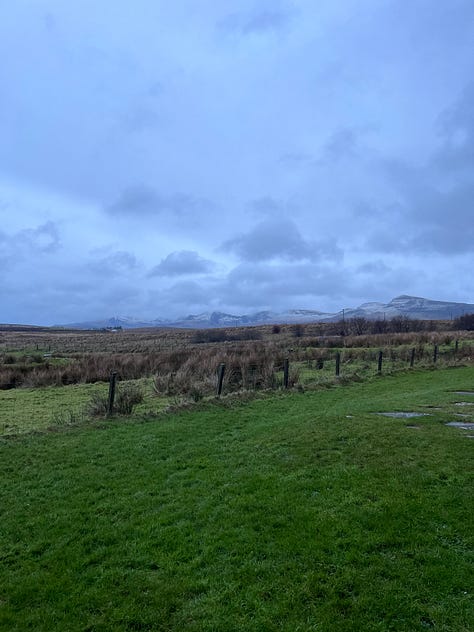
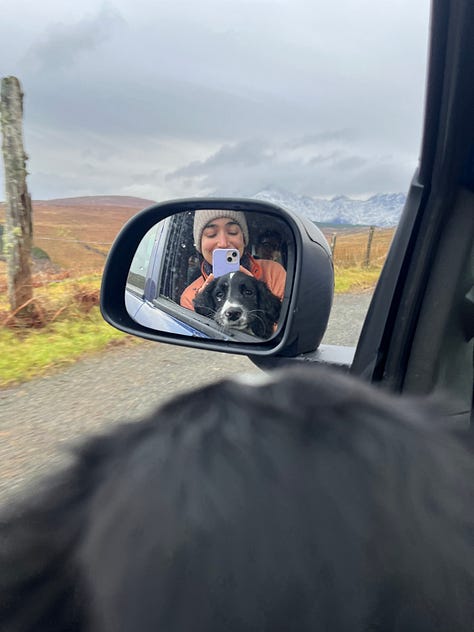
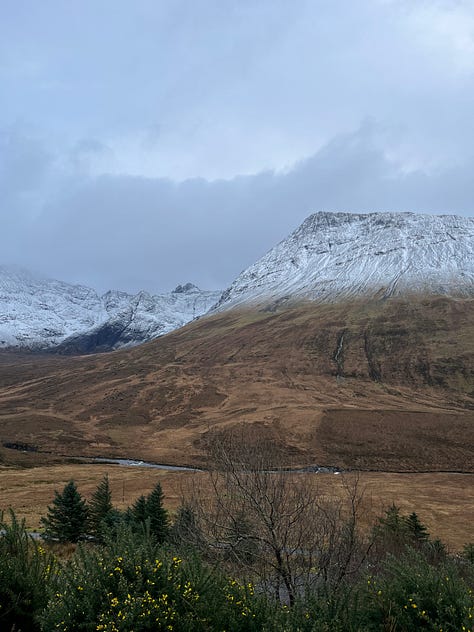
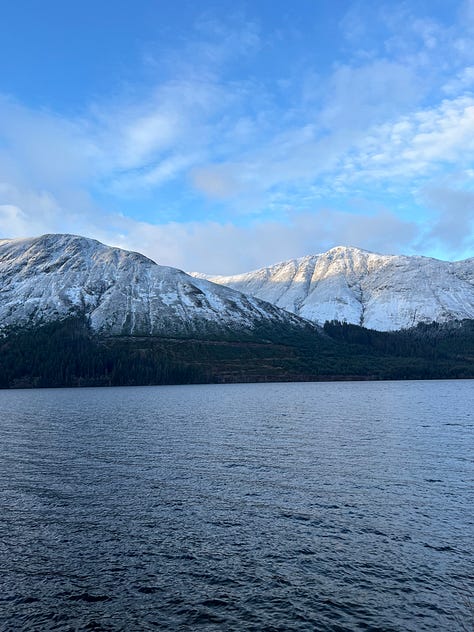
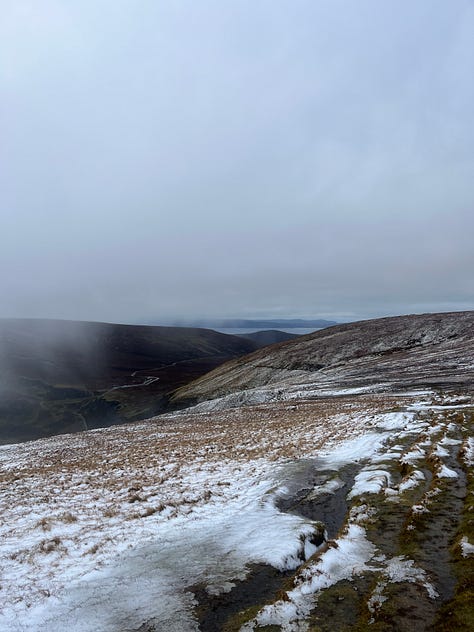
As a final 2024 piece of news, I was honoured to have my flash story, The Story of the Woman With Cold Hands, picked as one of the finalists for the 2024 Mslexia competition. It’s available to read in their last issue of the magazine. The story was inspired by one of the most magical islands I visited last year, which was tidal and located in the Kintyre peninsula: Island Davaar. I dispatched a newsletter from there too: At Various Ends of our World.
bread update
I baked more loaves than I usually do, to make crostini, to mop plates after celebratory meals, for the sandwiches we ate while hiking and for L.’s breakfasts. I baked bread to stretch a day spent with a friend, kneading and talking.
(This month, I followed the same recipe and routine as the one I had shared in November, mostly, albeit incidents.)
2024 was a turning year for my bread-making, and I owe most of what I have learnt to the brilliant Andrew Janjigian, whose newsletter Wordloaf is educative, generous and accessible. I can’t recommend a subscription enough, if you are looking to get started.
If you are on the hunt for a quick turnaround, I also highly recommend Sami Tamimi’s pitta recipe from Falastin, a cookbook co-written with Tara Wigley.
reading, listening
Back from my favourite second-hand bookshop in Glasgow, I stepped into my first Charlotte Brontë in years: Villette. There were nights when I devoured it and days I spent ignoring it, forasmuch it took me weeks to read the novel, rationing it like the box of good treats I import from France every other months. When I did read the words, I immersed myself into the book’s dense paragraphs, each saturated with imageries and emotions I don’t find as often in contemporary fiction – generous and unapologetic descriptions. Some of the sentences about illness rung true, especially, for the plain truth they disclosed. In the end, my interest for Villette was rooted in its format: it was long and unreliable, the pacing off beat. Villette didn’t try hard to win me over, but it did.
I asked for a bedroom; supper I could not take: I was still seasick and unnerved, and trembling all over. How deeply glad I was when the door of my very small chamber at length closed on me and my exhaustion. Again I might rest, through the cloud of doubt would be as thick to morrow as ever; the necessity for exertion more urgent peril (of destitution) nearer, the conflict (for existence) more severe.
— Villette by Charlotte Brontë
If you read my newsletter about undoing a reader’s journal, you’ll know that I also read The Green Ages by Annette Kehnel, translated from German by Gesche Ipsen. This is a broad history rather than an opinion piece, which uses examples from high to late Middle Ages in common living and sustainability to demonstrate that civilisations have always known highs and progress. After years of working hard to reach ‘modernity’, we are now suffering from a collective fear of change, othering how others live(d) as a form of self-(re)assurance. I didn’t subscribe to all the ideas in the book but it reminded me why I love to read historians: they apply data to the patience of a storyteller.
Another companion for this month, read on-the-go, was The Pebbles on the Beach: A Spotter’s Guide by Clarence Ellis and introduced by Robert Macfarlane. This one was a gift and delighted me as I have collected, painted, stored and hidden pebbles for years. There is one quote I thought resonated with the end of the year, about false similarities:
If you were to devote a whole lifetime to the scrutinising of pebbles one would be very lucky indeed to find two of them exactly alike, for, if they were identical in shape, they would almost differ in texture, colour, surface pattern, degree of hardness or nature of the rocks from which they originated.
— The Pebbles on the Beach by Clarence Ellis
Finally, putting things into perspective, I have had my yearly re-reading of Annie Ernaux’s The Years. This one needs no introduction, other than to say that I think Ernaux’s A Girl’s Story is an ally for the suggested read below.
Online, I am still thinking about Sleeping Women by Sophie Smith, an essay published in the LRB. This is a difficult read, so trade carefully.
The poet Muriel Rukeyser once asked: ‘What would happen if one woman told the truth about her life?’ ‘The world,’ her poem responds, ‘would split open.’ Gisèle Pelicot also believes that her testimony – her body on the screen, her words in court – might be enough to change society. Do we believe it too?
— Sophie Smith
in the kitchen
In December, it became too much too quickly in those kitchens, yet three quick fixes:
Roasted asparagus: in a bowl, mix three tablespoons of olive oil, one tablespoon of balsamic vinegar, one teaspoon of paprika, one grated garlic clove, salt and pepper. Rub the asparagus (woody part of the stems removed) with the mixture, cover them with a kitchen towel and set aside in the fridge to marinate for at least one hour. Preheat the oven to 180-200C, sprinkle the asparagus with rock sea salt and roast until they are cooked and crispy. Excellent side or brilliant lunch, served with a poached egg on top.
Pissaladière (tart version for ease*): slice 4 medium onions thinly. In a pan, fry the onions with some herbs (I use sage, thyme, tarragon and bay leaves). Over a low heat, sweat the onions for at least one hour. If they start burning, throw a gulp of water but keep the heat to a minimum; this is a work of patience. Inside a flat baking tray, roll out a puff pastry, prick the base with a fork and spread the onions homogeneously. Criss cross some anchovies and scatter some black olives on top. Roll the sides back towards the middle to form the crust sides and bake for approx. 30 minutes at 180C, or until the pastry is cooked and golden. Fantastic apéro, salty lunch or much needed packed snack at the library.
*the original pissaladière from Provence is prepared with a doughy base (closer to a pizza than a tart).
Brussels sprout: in a pan, gently fry one (sliced) shallot with one teaspoon of paprika and a drizzle of olive oil. Add the brussels sprout and the greens; throw a guld of boiling water and break half (or leave it full, depending on quantity) vegetable stock. Reduce the heat to a medium/low temperature and simmer until the vegetables are cooked. Sprinkle some chopped, sun-dried tomatoes on top. A good lunch and revenge on the plain, boiled brussels sprout.
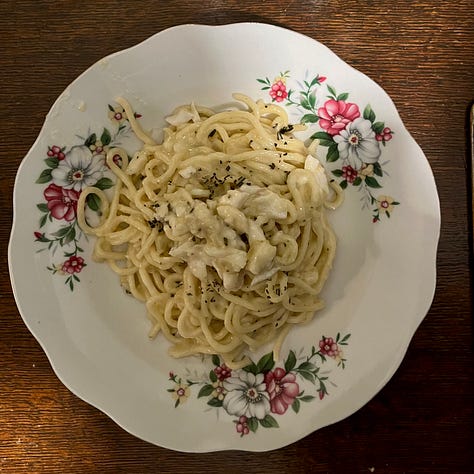
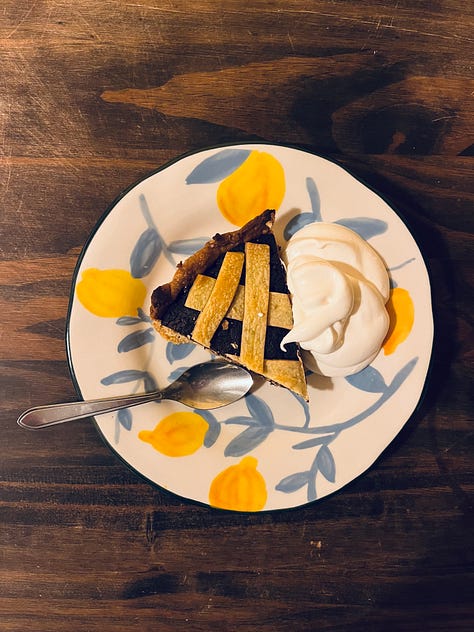
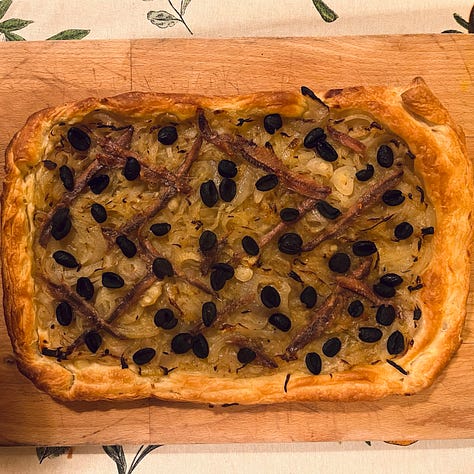
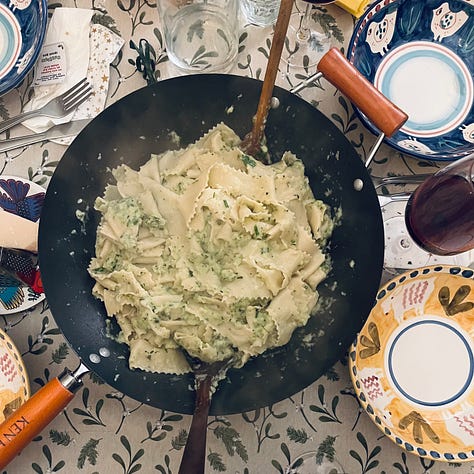
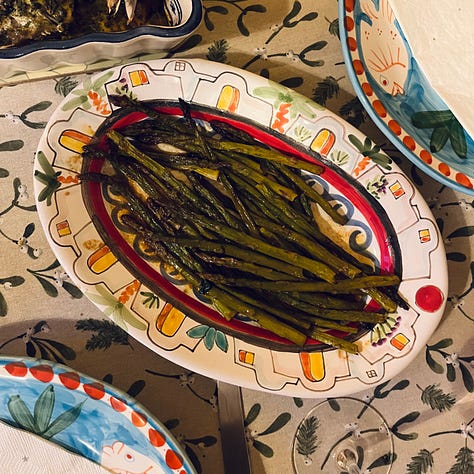
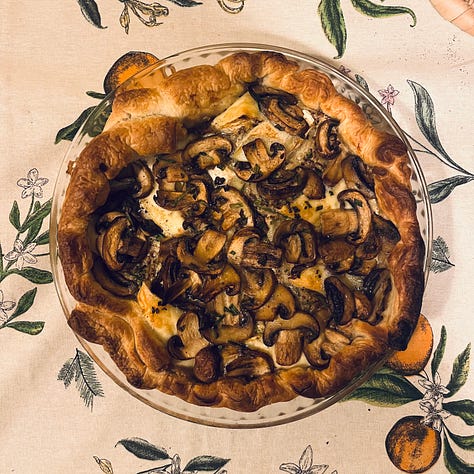
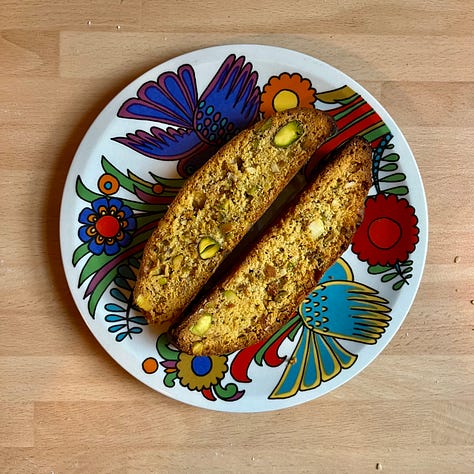
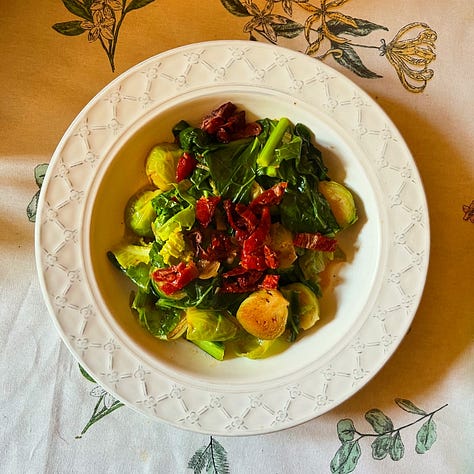
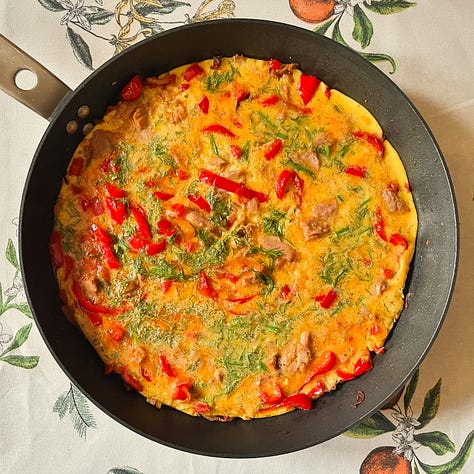
from The Onion Papers
I learnt to read aimlessly and to trust the sentence. – Undoing the Reader’s Journal, not a year’s round-up but a late reader’s approach to reading and some books I read.
The Gift of Time, or the final letter of 2024, featuring a pasta bake recipe.
looking ahead (Glasgow, GMT)
Mosses are green, birds puff into balls, I exhale in a thick smoke, cold inside my bone, as I wait for news about the first snowdrops. Precious, authoritative January has come again. I have cracked open a new diary; I have decluttered my desk, if not cleared my mailbox, but there is as much as one can ask from the depth of winter. Or, as Annie Ernaux wrote in The Years:
‘With all the intermingling of concepts, it was increasingly difficult to find a phrase of one's own, the kind that, when silently repeated, helped one live.’
I always write myself a letter at the start of a new year – speaking to my future self, feeling boundless with time. I had posted the first one when I was still a girl, scribbling or sketching thoughts, whereas, in recent years, I have simply filed the letter away in an envelope. I don’t re-read them, but I know that they exist and that I could, if I wanted to remember who I thought I would become then. The truth is, the expectations I had about the future will always be less relevant than the present and, if anything, there is always the moon to hold a dream or two for us. She will be present and hosting this month, flirting with Venus on the 3rd, Jupiter on the 10th and Mars on the 14th. The light will last a little longer every day; the moon will be full on the 13th day of the month, in Cancer, and is nicknamed the Stay-at-Home moon. I dedicate January to my influences, such as Marguerite Duras and her yellow kitchen (I wrote about them last year). It is fine to run out of steam for self-introspection too, to want to be drawn outward as well; there is a galette des rois to share with friends, thanks to Nigella Lawson’s recipe, and radicchio is in season, waiting to be cooked for one of my favourite risotto tricks, as taught by Russell Norman in the Polpo cookbook. Leeks, swirled with olive oil over a medium heat, make the best of creams when they are blended with garlic, rosemary, tarragon, sage and thyme – and the said cream will dress pretty much anything, from a quick pasta to giving consistency to a soup. Celeriac, parsnips, turnips; it’s time to peel and purée some roots vegetables.
Margaux
Thank you for reading. I’m Margaux, a writer and cook, and this is my hybrid newsletter. If you enjoy The Onion Papers, you can subscribe and come back for seconds (Thursdays are for long reads and Mondays for annotated recipes, both come out every other weeks) <3






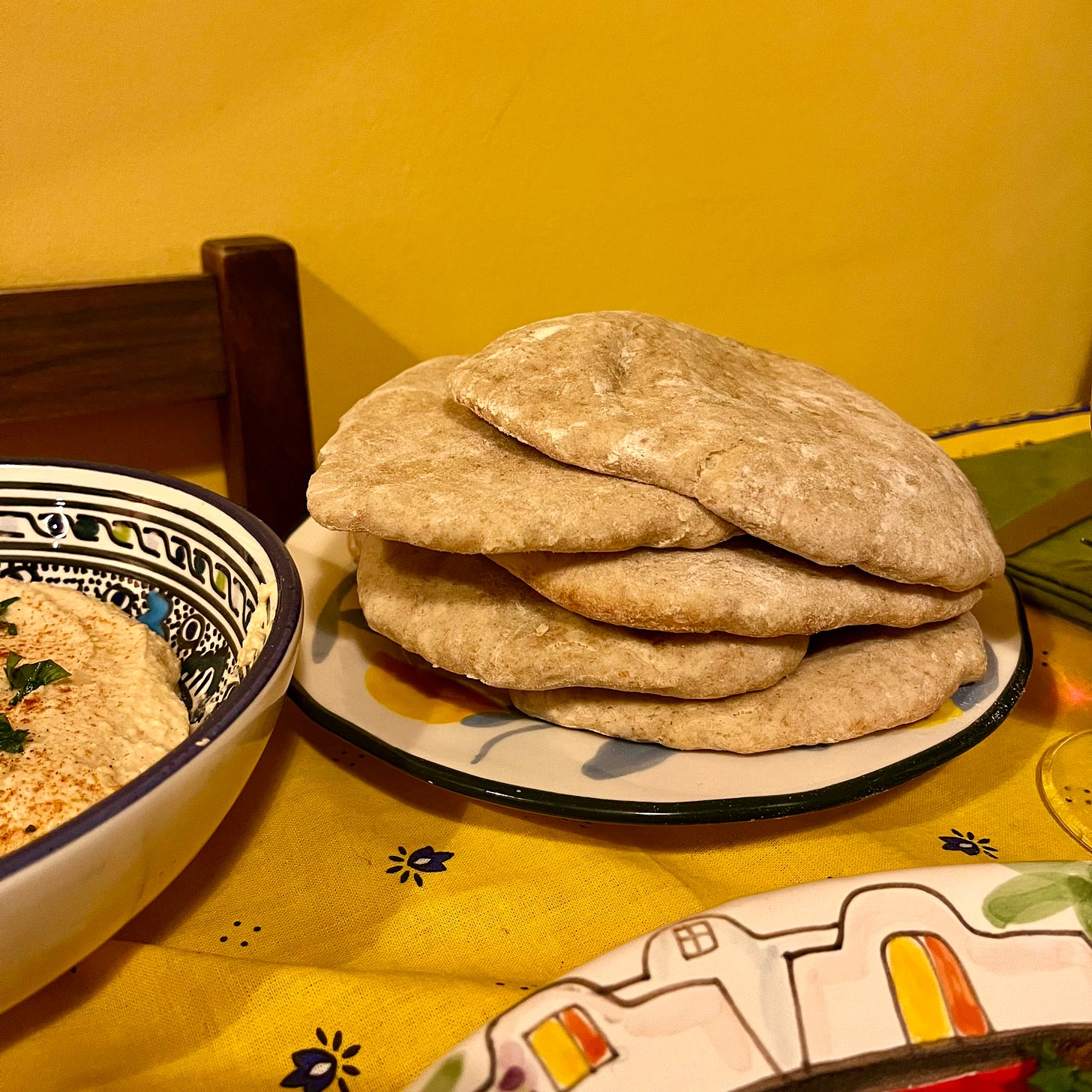
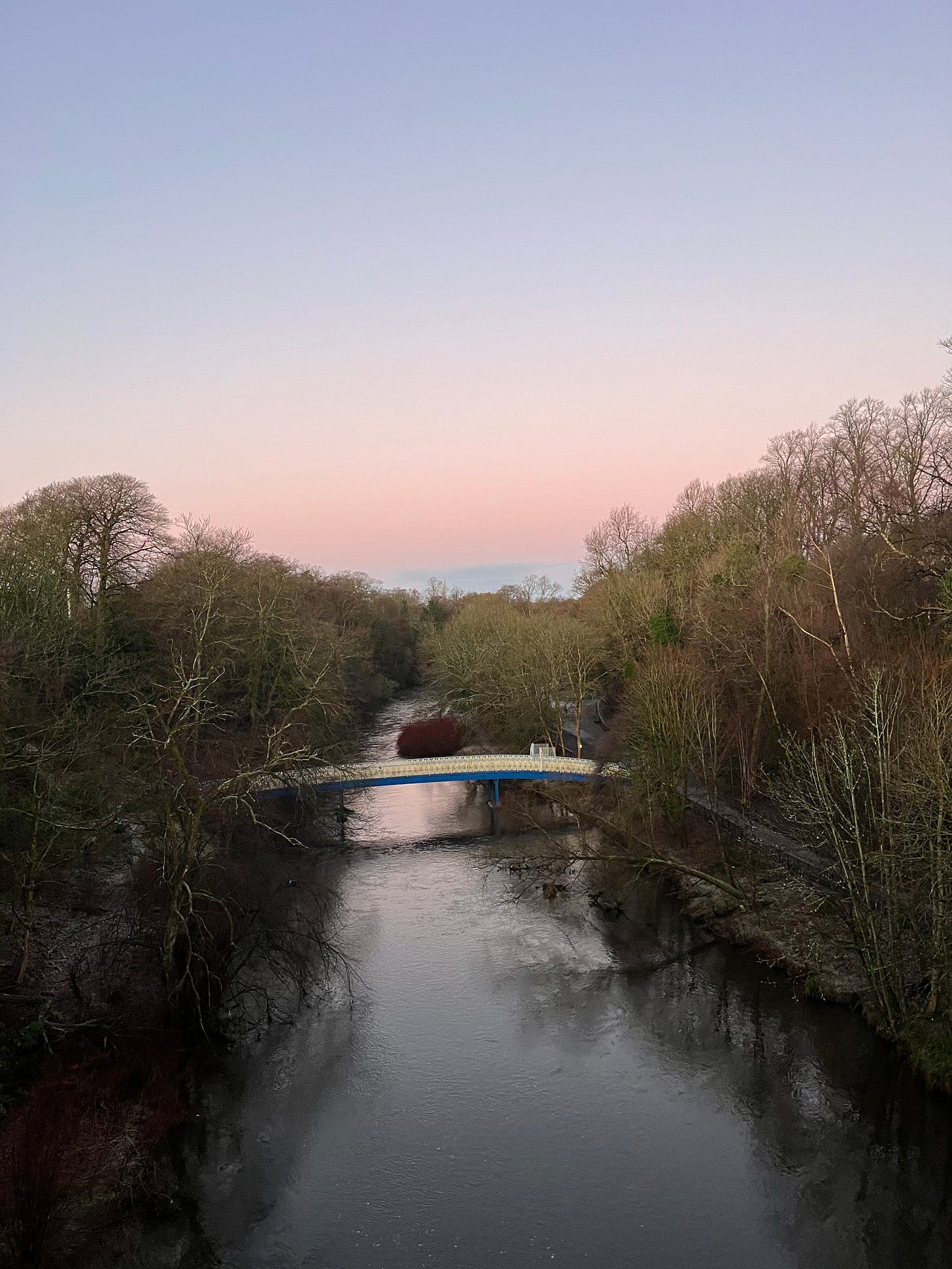

I simply adored this <3